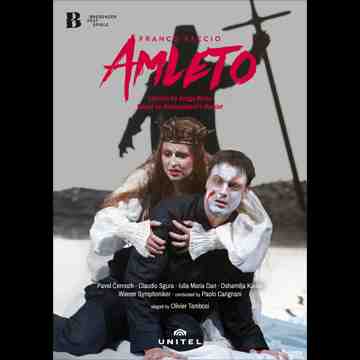Faccio: Hamlet
2016
Bregenz Festival 2016 Composer: Franco Faccio Pavel Černoch, Claudio Sgura, Iulia Maria Dan, Eduard Tsanga, Dshamilja Kaiser, Sébastien Soulès, Bartosz Urbanowicz, Paul Schweinester, Jonathan Winell, Sabine Winter Orchestra: Wiener Symphoniker Chorus: Prague Philharmonic Choir Stage Director: Oliver Tambosi Conductor: Paolo Carignani
This production “offers all an Italian-opera-lovercould possibly desire” wrote the Frankfurter Allgemeine Zeitung after the revival of this “forgotten gem” at the Bregenz Festival: on occasion of the fourth centenary of William Shakespeare’s death, the festival continued its rediscovery series with Amleto, an opera by Verdi contemporaries Franco Faccio and Arrigo Boito, based on Shakespeare’s tragedy Hamlet. Premiered in 1865 in Genoa and restaged in 1871 at Milano’s La Scala, “Amleto” was only revived in 2014 concertante in the US before its “triumphal rebirth” (Deutschlandradio Kultur) at the Bregenz Festival, where the opera was also recorded for the first time ever. Faccio, who conducted the first performance of Verdi’s Aida in Italy and the world premiere of Otello, and Boito, Verdi’s librettist of Otello and Falstaff, skillfully and effectively challenge the conventions of Italian opera, which they wanted to revitalize by infusing it with the spirit of Shakespeare’s drama. Anticipating the musical language of later Italian verismo composers, the opera combines lovely musical interludes with superb vocal writing. Heading a supreme cast, Pavel Černoch as Amleto delivers superbly, “using his colorful tenor skillfully to develop the transformation of the insecure youngling to the ice-cold avenger” (NZZ) and “granting the work large scale” (Abendzeitung). Iulia Maria Dan lends her melting soprano to Ofelia. Under the baton of Paolo Carignani with the Vienna Symphoniker and Prague Philharmonic Choir “it carried terrific punch (The Telegraph)”. Olivier Tambosi’s “excellent staging served it well, with a clear focus on the high points (The Telegraph)”. “In the intermission and at the end there was vociferous enthusiasm of the audience for the late first encounter with this music” (NeueMusikzeitung).

